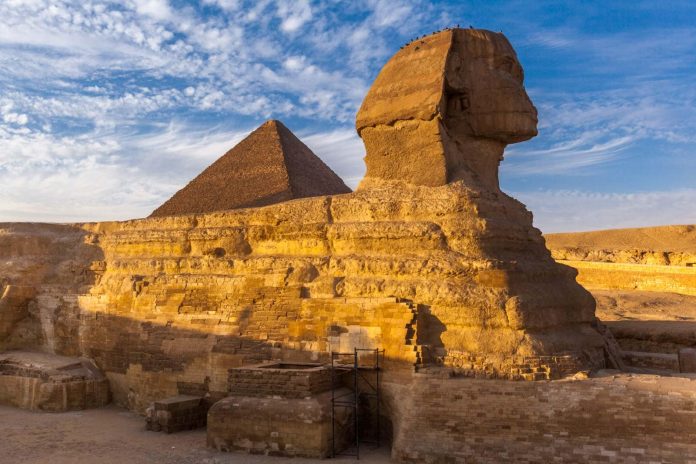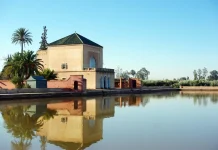Let’s get right to the massive query: Is Egypt secure to travel? For the traveler that informed and ready, the reply is yes, and it’s an incredibly rewarding destination. We’ve explored the country ourselves multiple times and may let you know that standing before the Pyramids of Giza or wandering through the temples of Luxor is an experience that stays with you endlessly.
But it’s also not a visit to take flippantly. Egypt is an intense and infrequently chaotic place that requires a distinct level of awareness than, say, a road trip through Canada. The challenges are real, from persistent touts to common travel scams, and it’s essential to go in along with your eyes open.
We imagine in honest, real-world advice to assist you travel higher. In this guide, we’re breaking down every little thing you really need to learn about whether it’s secure to travel to Egypt. We’ll cover the present situation on the bottom, common scams to avoid, specific advice for solo female travellers, and our greatest practical tips from our own trips.
Is Egypt Safe To Travel Right Now: Quick Summary
For those searching for a fast answer, here’s our summary of the protection situation in Egypt.
- Overall Risk: Medium. While violent crime against tourists is rare, petty crime, scams, and harassment are common. Situational awareness is crucial. While the chance of terrorism exists, attacks targeting tourists are rare and security has been increased at major sites.
- Popular Tourist Areas: Major tourist sites like Cairo, Luxor, Aswan, and the Red Sea resorts are heavily policed and customarily considered secure.
- Solo Female Traveller Risk: High. Solo women will likely face persistent and unwanted attention. We recommend hiring a trusted guide or joining a small group tour.
- Common Scams: Be prepared for scams involving taxis, bazaar merchants, and unofficial guides. Always agree on a price beforehand.
- Tap Water: Not secure to drink. Stick to bottled or filtered water in any respect times.
- Our Top Tip: Hire a licensed guide or join a good tour, especially for major historical sites. It drastically reduces hassles and enhances the experience.
Why Does Egypt Have a Reputation for Being Unsafe?
It’s a legitimate query, and the priority doesn’t come from nowhere. For a lot of us, our important exposure to modern Egypt has been through news reports covering a decade of intense political change and isolated security incidents.
The 2011 Revolution, a part of the broader Arab Spring, was a pivotal moment of political unrest for the country. While it was fundamentally a domestic political event concerning the way forward for Egypt, the photographs of mass protests and instability were broadcast globally. This period of upheaval understandably made many travellers hesitant, and the tourism industry, which is an important a part of the country’s economy, took an enormous hit.
We were in Egypt just after the revolution, and yes, there have been plenty of security forces and Egyptian police around, but we did feel secure.
In the years that followed, there have been also several isolated but serious security incidents that targeted tourist areas. These tragic events were widely reported and further solidified the perception of risk within the minds of potential visitors.
However, it is necessary to put these events in today’s context. The situation on the bottom has stabilized significantly. In response to past incidents, there may be now an enormous emphasis on tourist security, with a visual police and military presence in any respect major sites, hotels, and along the important travel routes.
While no country is 100% free from risk, the events of the past have led to among the most stringent security measures you’ll find anywhere on the planet.
Current Egypt Travel Advisory & Security Situation
Before any trip, we all the time recommend checking the official travel advisories out of your government, like Global Affairs Canada or the U.S. Department of State. These advisories can sound intimidating, often using cautious language. It’s their job to tell you of each possible risk, from petty crime to political instability.
Check the Current Travel Advisories here:
The secret is to know that these warnings are sometimes for your complete country and don’t all the time reflect the situation within the important tourist areas. There’s an enormous difference between the favored travel corridor (Cairo, Luxor, Aswan, and the Red Sea) and the regions which can be explicitly advised against, just like the North Sinai Peninsula or the western desert on the border with Libya.
We remember reading the advisories before our first trip, and to be honest, it gave us a moment of pause. But once we were on the bottom in Luxor, surrounded by local families and other travellers exploring the temples, the sensation was one among excitement, not fear. It’s a superb reminder that while advisories are a vital tool, they don’t all the time capture the total, on-the-ground experience.
Is Cairo, Egypt Safe? What About Other Cities?
Yes, Cairo and other major cities on the tourist trail are generally secure, but it surely’s essential to do not forget that Egypt is a big country, and the experience may be very different from one place to a different. The vibe in bustling Cairo is a world away from the relaxed pace of a Nile-side town or a Red Sea resort.
Safety in Cairo
Cairo is one among the world’s great megacities. With greater than 20 million people, it’s crowded, chaotic, and incredibly vibrant. We’ve spent plenty of time navigating its streets, and while the energy can feel overwhelming, we never felt personally unsafe. The important concerns listed below are petty crime, like pickpocketing, in crowded areas just like the Khan el-Khalili bazaar, and the wild traffic. Use common sense: keep your valuables secure, and look each ways (three or 4 times) before crossing the road.
Safety in Luxor and Aswan
Once you travel south to Luxor and Aswan, the pace slows down considerably. Life revolves across the Nile, and these cities feel more manageable than Cairo. The primary challenge here isn’t crime, however the “hassle factor.” You will likely be approached consistently by people attempting to sell you a carriage ride, a felucca ride, or a tour.
In Aswan, we will need to have been offered a ship ride 100 times just walking along the river. A firm but friendly “La, shukran” (No, thanks) and continuing to walk is one of the best solution to handle it. It may be tiring, but it surely’s more of an annoyance than a real safety threat.
Safety in Red Sea Resorts (Sharm el-Sheikh, Hurghada)
The Red Sea resorts are a totally different world. Places like Sharm el-Sheikh and Hurghada exist in a “resort bubble” with a heavy give attention to tourism and security. You will often go through a security checkpoint on the roads leading into these areas. Within the resorts themselves, the atmosphere is relaxed and the most important safety concerns are similar to some other beach destination: watch your belongings and don’t overdo it within the sun.
When you see travel warnings for Egypt, they’re almost all the time referring to 2 specific regions: the Sinai Peninsula (but not the Sharm El Sheikh resorts) and the western desert. These aren’t places for independent travel, and any essential trip there would require an armed escort for security.
Common Scams and Annoyances in Egypt
Part of the travel experience in Egypt is navigating the constant sales pitches and customary scams. Foreknowledge is your best defence. Most of those are more of an annoyance than a danger, but knowing what to search for will make your trip much smoother and prevent some money. For example, when someone offers photo ‘assistance’ at a tourist site, they often expect a small tip, known locally as ‘baksheesh’, in return. Here are a number of of essentially the most common ones we’ve encountered.
The “Come See My Shop” Approach
You’ll be walking near a market or temple, and a friendly local will strike up a conversation. After a number of minutes of pleasantries, they’ll inevitably invite you to their cousin’s or brother’s shop for a “special price.” This is a quite common and customarily harmless tactic. The best response is a smile and a firm, “No, thanks” as you proceed walking.
Aggressive Taxi Drivers
This is a classic travel scam worldwide. A driver might let you know their meter is broken after which quote you a ridiculous price at the tip of your ride. To avoid this, all the time agree on the fare before you get into the cab. Better yet, use a ride-sharing app like Uber or Careem where the value is fixed and tracked within the app.
The Papyrus or Perfume Shop Detour
Our guide in Giza was unbelievable, but he was very keen for us to go to a “government-approved” papyrus institute. We went together with it and it was an interesting, if lengthy, sales pitch. Many guides or drivers receive a commission for bringing tourists to those specific shops. It is perfectly tremendous to politely decline by saying, “Thank you for the offer, but we’d prefer to spend more time on the temple.” A great guide will all the time respect your wishes.
Photo “Assistance” for a Fee
At major sites, someone may offer to take a photograph of you from a “perfect spot.” After they’ve taken a number of shots along with your camera, they’ll then demand a hefty tip (baksheesh) for his or her service. If you don’t need to pay for this, just politely refuse any offers for help along with your photos from the beginning.
Health & Hygiene in Egypt
Staying healthy is a big a part of having fun with your trip. A bit little bit of caution and pre-planning can go a good distance in ensuring you’re feeling your best while exploring.
Can you drink the faucet water in Egypt?
Let’s be direct: no. You mustn’t drink the faucet water in Egypt. The local water system isn’t treated to the identical standards that visitors are used to, and it incorporates different bacteria that may easily result in stomach upset.
Always persist with sealed bottled water. We even recommend using bottled water to brush your teeth as an additional precaution. It might sound overly cautious, but it surely’s an easy step that may prevent from a day or two of discomfort.
Food Safety & Avoiding “Pharaoh’s Revenge”
The dreaded traveller’s stomach is an actual concern for a lot of, but you don’t need to live in fear of the food. We ate loads of delicious meals, including street food, and were perfectly tremendous by following a number of easy rules.
- Eat at busy places. A restaurant or food stall popular with locals means high food turnover and brisker ingredients.
- Choose cooked food. Hot, freshly cooked dishes are all the time a safer bet than food that has been sitting out, like raw salads.
- Peel it or forget it. Only eat fruit which you can peel yourself, like bananas and oranges.
- Be careful with ice. Unless you’re in a high-end hotel, it’s best to ask in your drinks with no ice, as it might be made out of tap water.
What vaccinations do I would like for Egypt?
We are travel experts, not medical professionals, so it is crucial that you simply seek the advice of along with your doctor or a travel clinic before your trip. They can offer you personalized advice based in your health history.
Generally, they’ll ensure your routine vaccinations are up to this point. They may additionally recommend additional vaccinations reminiscent of Hepatitis A and Typhoid, that are common for travel in lots of parts of the world.
Is Egypt Safe for Solo Female Travellers?
Egypt is a difficult destination for solo female travellers, but it surely can be travelled safely by following a number of key precautions. It is a really different experience from travelling as a person or as a pair. The important issue is the high level of verbal harassment and unwanted attention you’re prone to receive.
Speaking from my (Deb’s) perspective, it’s a rustic where you consistently must have your guard up. While this attention is sort of all the time a case of annoying catcalls or persistent staring reasonably than a physical threat, it could possibly be mentally exhausting over time and may detract from the incredible experience of being there.
This isn’t to say you shouldn’t go. Many women travel solo through Egypt and have an incredible time. But being prepared is the important thing to a successful trip.
Here is our greatest advice for solo female travellers:
- Dress Conservatively. This is our top tip. By covering your shoulders and knees and wearing looser-fitting clothing, you show respect for the local culture and can attract far less unwanted attention. A light-weight scarf can also be an ideal tool to have available to cover your head when entering mosques.
- Consider a Tour or Guide. Especially for a primary visit, joining a small group tour or hiring a non-public guide could make a world of difference. It lets you give attention to the history and fantastic thing about Egypt without having to navigate the hassles on your personal.
- Be Confident. Walk with purpose and project confidence, even should you are feeling a bit lost. Avoid prolonged eye contact and don’t be afraid to be firm and say “no” loudly if someone is bothering you.
- Wear a Fake Wedding Ring. It’s an easy trick, but wearing a plain band in your ring finger may help deter some unwanted advances.
- Use Ride-Sharing Apps. Stick to Uber or Careem as a substitute of hailing taxis on the road. It provides a digital record of your trip and driver, and the value is about prematurely.
Top 10 Safety Tips for Egypt
Here is a fast summary of our most vital safety tips for visiting Egypt. Following these will assist you stay secure, avoid hassles, and give attention to the incredible experience of your trip.
- Hire a Licensed Egyptologist/Guide. A great guide is value their weight in gold. They won’t only bring the traditional sites to life but may even handle logistics and keep touts at bay, making your day infinitely more enjoyable.
- Dress Conservatively. Show respect for the local culture by covering your shoulders and knees. Looser-fitting, lightweight clothing is essentially the most comfortable and appropriate option for each the climate and the culture.
- Never Drink the Tap Water. This is a non-negotiable rule. Always persist with sealed bottled water for drinking and even for brushing your teeth to avoid getting sick.
- Learn to Say “La, Shukran”. A firm but polite “No, thanks” in Arabic is essentially the most effective solution to take care of persistent sellers and touts.
- Always Agree on a Price First. Before you get in a taxi or conform to a carriage ride, confirm the value with the motive force. This easy step prevents arguments and scams later.
- Keep Valuables Secure. Use common sense. Don’t flash expensive jewellery or money, and keep your wallet and phone in a secure front pocket or a zipped bag, especially in crowded markets.
- Purchase Travel Insurance. Things can and do go unsuitable whenever you travel. Having good travel insurance from a provider like World Nomads or SafetyWing is crucial for peace of mind.
- Be Mindful of Your Health. Stick to freshly cooked hot meals and fruit you’ll be able to peel yourself to reduce your risk of stomach issues.
- Share Your Itinerary. Always leave a replica of your travel plans with someone back home in order that they know your general whereabouts.
- Trust Your Gut Instincts. This is the golden rule of travel. If a situation or an individual feels off, it probably is. Don’t be afraid to remove yourself from any situation that makes you’re feeling uncomfortable.
Should You Use a Tour Operator or Group Tour?
Yes, for many first-time travellers to Egypt, we highly recommend using a good tour operator. While we regularly travel independently, for a rustic like Egypt, we highly recommend using a good tour operator or joining a small group tour, especially for a primary visit. The value it adds to your trip when it comes to each enjoyment and peace of mind is gigantic.
Here’s why we expect it’s a sensible selection:
- It Eliminates the Hassle. This is the only biggest advantage. A great guide and operator will handle all of the logistics, from buying tickets to arranging transportation. Most importantly, they act as a buffer between you and the persistent touts, allowing you to really benefit from the sites.
- You Get Invaluable Context. Exploring a 4,000-year-old temple is impressive, but having a certified Egyptologist explain what you’re seeing brings the history to life in a way no guidebook can.
- It Adds a Layer of Security. Navigating a recent country may be intimidating. Having an area guide who knows the customs and a small group of fellow travellers provides a welcome sense of security and support.
- It’s More Efficient. Tour operators know one of the best times to go to sites to avoid the worst of the crowds and the midday heat. You’ll likely see more, and in greater comfort, than should you were arranging every little thing on your personal.
This doesn’t mean you’ll be able to’t travel Egypt independently, as many individuals do. However, it requires an ideal deal of patience and planning. For a primary trip, we imagine the advantages of an organized tour far outweigh the prices. It streamlines the experience and lets you give attention to the magic of the place, not the frustrations. We often book day tours through sites like GetYourGuide or Viator to vet local operators.
What Should I Wear in Egypt?
Deciding what to wear in Egypt is about balancing comfort for the warmth with respect for the conservative culture. For each men and girls, we recommend lightweight, loose-fitting clothing that covers your shoulders and knees.
This isn’t nearly entering religious sites; dressing more conservatively will assist you mix in and may significantly reduce unwanted attention, especially for ladies. Think linen trousers, long skirts or dresses, and t-shirts or blouses reasonably than tank tops. A light-weight scarf is essentially the most useful accessory you’ll be able to pack, perfect for sun protection, a little bit of warmth on a cool evening, or for ladies to make use of as a head covering when visiting a mosque.
The Verdict: So, Should You Travel to Egypt?
So in spite of everything that, we come back to the massive query: do you have to travel to Egypt? Our answer is a definite yes, but on one condition: you might have to be a prepared and mindful traveller.
Let’s be clear, Egypt isn’t a destination where you’ll be able to completely switch off your brain. There are regions to avoid, because the official travel advisories indicate, and the hassles within the important tourist areas are real. It is a rustic with a posh present in addition to an impressive past.
But from our experience, the reward massively outweighs the challenges. The desire to welcome travellers back is something you’ll be able to feel from the people you meet. Responsible tourism is incredibly essential here, and there may be a shared understanding that a secure and positive experience for visitors is crucial for the country’s future.
For us, the prospect to face within the shadow of monuments built 1000’s of years ago is a real privilege. If you’re a traveller who’s resilient, patient, and armed with good information, we imagine you need to absolutely go. It is a visit that can challenge you, awe you, and follow you long after you might have come home.
Frequently Asked Questions about Egypt Travel Safety
Yes, taking a Nile cruise is taken into account one among the safest ways to see the foremost historical sites between Luxor and Aswan. The boats are secure, and all travel is completed throughout the heavily protected tourist corridor.
For police, dial 122. For an ambulance, dial 123. It’s a superb idea to avoid wasting these in your phone, together with the contact information in your country’s embassy in Cairo.
Most travellers, including those from Canada, the USA, and the UK, need a visa to enter Egypt. These can typically be obtained on arrival on the airport or prematurely through the official e-Visa portal.
We don’t recommend driving in Egypt. The traffic, especially in Cairo, is incredibly chaotic, and driving rules are very different from what most visitors are used to. For transport, it is far safer to depend on reputable tour operators, domestic flights, trains, or ride-sharing apps like Uber.
Yes, Egypt could be a unbelievable destination for families. Egyptians adore children, and your kids may act as an icebreaker. However, the warmth, long travel days, and chaotic cities may be difficult for little ones, so we recommend joining a family-focused tour with a slower pace.
Absolutely. Haggling is part of the culture in markets and bazaars just like the Khan el-Khalili. The first price you’re quoted is never the ultimate price. Always be polite and keep a way of humour, and don’t be afraid to walk away should you can’t agree on a price you’re comfortable with.
The official currency is the Egyptian Pound (EGP). While some tour operators or hotels may accept US Dollars or Euros, it’s best to make use of Egyptian Pounds for every day expenses like food, taxis, and market purchases for one of the best rates. ATMs are widely available in cities.
Escape the ordinary and discover the extraordinary! From bustling cities to serene landscapes, every journey begins with a single step—let us guide yours. Enjoy curated itineraries, hidden gems, and hassle-free bookings designed for explorers at heart. Whether it's a weekend getaway or a globe-trotting adventure, your Next unforgettable experience is just a click away.










